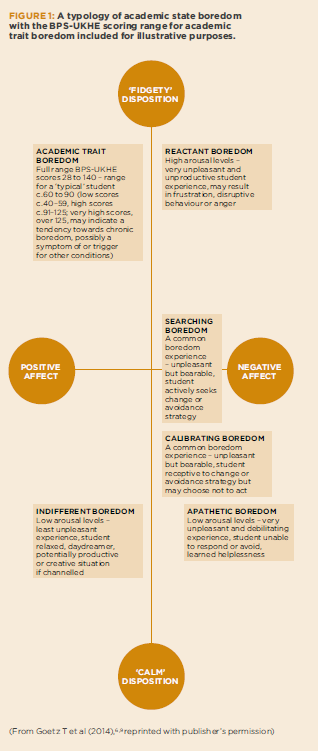An emerging field
Students attending university and college get bored. Who would have guessed? It’s meant to be the most personally, socially and intellectually rewarding time of their lives, yet lecturers know full well what boredom looks like, of course – they see it every day – perhaps more often than they might care to admit.
Warning signs, though by no means conclusive, include drowsiness and yawning, heads in hands, slouching, avoiding eye contact, vacant stares, repeated finger or foot tapping, mobile phone or laptop distractions, task avoidance and persistent clock watching. Overheard statements like ‘watching paint dry’, ‘as dull as dishwater’ and ‘bored to tears’ are more overt. But what do we know about ‘academic boredom’, the term now used to describe the boredom experienced by students in higher education? If the research literature is anything to go by, not much at all, it would seem, at least not in the UK, where the field is worryingly underdeveloped but emerging. According to some reports,1 members of the general public get bored on average about six hours a week; 25 per cent of office workers are thought to be bored at any one time of the day; and up to 50 per cent of pupils are regularly bored at school, and in some subjects more than others. Why should it be any different for students? In a recent survey undertaken by Sandi Mann and Andrew Robinson at the University of Central Lancashire, 68 per cent of student participants found their lectures boring at least some if not half of the time, and a staggering 30 per cent more often than that.2 Academic boredom is a disabling, achievement-related emotion which contributes, usually adversely, towards student engagement and overall academic performance. As a lived experience worthy of investigation, academic boredom is far from trivial.
Matters of state and trait
In the 50 years or so leading up to and throughout the 1980s, psychologists, psychiatrists and psychotherapists demonstrated that work-related boredom occurred as a reaction to familiarity and repetition, that the actual experience reported by different individuals undertaking the same repetitive tasks varied considerably, and that boredom could come and go within minutes or feel like an eternity. Boredom was seen as a state of subjective monotony. As a state, interest was directed towards the actual experience of boredom in the moment. The 1980s also witnessed some of the first attempts to model boredom in detail and to locate it theoretically.3 A breakthrough for the study of boredom in general came with publication of Richard Farmer and Norman Sundberg’s Boredom Proneness Scale (BPS) in 1986,4 an easy-to-administer, 28-item, self-report questionnaire with a true-false scale. The BPS measured boredom as a trait: the recurring propensity or habitual disposition of individuals toward becoming bored. As witnessed by the proliferation of studies published throughout the 1990s, the impact of the BPS was considerable. Due in no small measure to the work of Stephen Vodanovich at the University of West Florida, and others, boredom became associated with a range of human conditions and pathologies, including loneliness and withdrawal, depression, disruptive or aggressive behaviours, drug and alcohol abuse, smoking, gambling, sexual promiscuity and risk taking. Definitions also became more refined, with boredom widely considered an unpleasant ephemeral state accompanied by a loss of interest and concentration. Despite often involving students as participants, however, few studies considered the nature of their higher education experience. The emergence of academic boredom as a distinctive form only really took place about 15 years ago.
Contemporary developments
As a complex, achievement-related emotion, academic boredom is now defined as ‘an intense and often brief psychophysiological change in response to a supposedly meaningful educational event’ and located within control-value theory.5 Academic boredom’s complexity arises because of its cognitive, affective, motivational and behavioural dimensions as well as its highly situated and transient nature, all of which renders it difficult to isolate and study. Control-value theory acknowledges academic boredom’s ‘hybridity’ in ‘real-life’ educational settings, while offering valuable predictions of success or failure in connection with academic life. In essence, negative and disabling emotions like boredom interfere with how students exercise influence or control over their circumstances, reducing any benefits or rewards to be derived. Drawing on our own contribution to the field as educators,6,7 and from research undertaken by Reinhard Pekrun,8 Thomas Goetz,9 Taylor Acee10 and Virginia Tze,11 psychologists working with students in Germany, the United States, Canada and China, not only has it been possible to identify those students more prone to academic boredom than others, but the types of academic boredom they experience have been identified with more precision. While the exact relationships between academic trait and academic state boredom remain somewhat speculative (see figure below), this combined body of work offers considerable diagnostic potential in an applied sense. What we now know with more certainty is that academic boredom occurs as a result of how courses are designed, delivered and assessed as well as how individuals take to being a student. In other words, academic boredom arises when students are required to do the same things, in the same ways, over and over or can’t find anything of interest or sufficiently stimulating or motivating to do for themselves. Having time on their hands at university or college also means having to fill it, and what students fill it with can also become boring. While most students can snap out of their academic boredom with ease, others, it would seem, are far less fortunate. For a few, the effects can be chronic. Why some students are more prone to academic boredom than others and respond to it in different ways remains a mystery. Neuroscientists know that emotional experiences are generated and regulated across different parts of the brain, with boredom thought to have a particular connection with the insular cortex. Similarly, boredom has become associated with low levels of the neurotransmitter dopamine and dopamine activity. While it is tempting to draw inferences and conclusions, the problem we have here is that while neuroscientists, psychologists and educators often ask the same sorts of questions, they approach them in completely different ways and at different levels of abstraction. What is discovered in the laboratory doesn’t always transfer readily into the lecture theatre.

Engagement and performance
The impact of academic boredom on engagement and performance hit home in our work with 235 final year Education Studies students at a single UK higher education institution.7 In accordance with control-value theory, almost three-quarters of respondents found tutorials and seminars interesting or engaging most, if not all, of the time. The tutorials and seminars involved smaller group sizes and the agenda was often set by students themselves. By contrast, fewer than half thought the same of traditional, whole-year lectures (still a welcome finding, running contrary to their popular demonisation). Importantly, a greater proportion of those considered more prone to academic boredom than others were the most adversely affected, a statistically significant theme repeated throughout. Commenting generally on the main ingredients of an interesting or engaging lecture, all respondents were clear in their views, with the perceived personal attributes and qualities of the lecturer top of their list (lively personality, animated, enthusiastic, motivating, passionate and humorous). When asked to comment on those factors which made lectures particularly dull or boring, seven central themes emerged: an excessive and inappropriate use of PowerPoint presentations (not PowerPoint per se), poor lecturing style, little or no interaction, lack of relevance of content, lack of coherency and pace, disruptive student behaviour and the lecture theatre environment. The sources of academic boredom among the most prone were clearer at the interviews with students that we conducted as part of our research:
'Sometimes when lecturers have used a lot of PowerPoints and not really interacted with everyone … it becomes a bit monotonous and my brain switches off. I don’t like it when people turn the lights off … that makes me more sleepy … The speed of the content that’s been covered in the lecture, especially if it’s new … I get completely muddled … I feel frustrated at myself because I feel like I should be concentrating … It feels a bit pointless.’
In terms of coping, students also adopted other strategies: daydreaming (not necessarily a bad thing), texting, doodling or scribbling over handouts, and talking to their neighbour. Surprisingly few left at breaktimes and few took to social media or email or played games on mobile phones. Falling asleep, making ‘stupid noises’ or comments and deliberately laughing out loud were also thankfully rare. On occasion, some coping strategies resulted in other productive coursework being undertaken. Academic boredom also arose in connection with the assessment of course modules which, for written assignments, involved studying on and off campus:
‘I find [them] interesting at first but then it becomes more of a task and I find it boring. I think that sometimes it’s fear of doing badly, but a lot of the time I’m working to the deadline and I’m constantly thinking “I’ve got to get this in” … I think that’s down to poor time management … I think I want to do well, but I think it’s the confidence sometimes, especially if I’ve had a previous assignment that’s not had that much of a good mark.’
The level of boredom experienced with assignments was also determined by the type of assignment set and the freedom given over what to do. Taken together, and on balance, those more prone to academic boredom than others seemed less fulfilled, they described their attendance as good rather than excellent, they devoted fewer hours to self-study (nearly eight hours a week on average), and they adopted weaker and more superficial, rather than deep or strategic, approaches to studying and learning. While direct cause-effect relationships remain uncertain, this translated into a six percentage point average reduction in the final degree mark. Though not a large difference in itself, this translated into fewer than half obtaining first and upper second class degrees, much less than the participant group as a whole.
Boredom mitigation
In that odd ‘tell us something we don’t already know’ sort of way, academic boredom exerts a sometimes strong influence over how some students engage with and respond to their course and the teaching-learning environment encountered at university or college. That said, few ‘global’ theories and theorists of learning in higher education seem to give emotion, and boredom, in particular, much space – Knud Illeris and Noel Entwistle being notable voices in the wilderness.12,13 As we begin to identify when, where and how academic boredom arises, of course, questions turn to what can be done about it by way of intervention or prevention. Given the diversity of cultural traditions and pedagogical norms found across the sector, and the paucity of evidence with which to address them, finding answers will never be easy. As we, and others, believe, however, boredom mitigation might begin by placing students at the heart of a transformational process which considers not only how courses are designed and delivered, but how teaching for learning and assessment acknowledges academic boredom’s debilitating effects. Here, we join the call for innovative and better quality instruction in the form of more diverse and emotion-oriented teaching. This will make for uncomfortable reading in certain quarters, of course.
Students might also be supported towards establishing new and distinctive ways of thinking and working by being provided with greater variety and freedom of choice over what to study and how, while making course content and the different contexts in which it is applied more relevant. Why different forms of academic practice and interaction are adopted over others, together with the emotional demands of transitioning into and throughout higher education, should also be more carefully articulated and introduced from a very early stage – possibly at induction, during which the process of academic socialisation begins (eg promoting independence as well as teamwork, establishing positive relationships and attitudes, learning how to take initiative and to learn). Students themselves are not always best placed to recognise their own emotions, however, or to know what they mean or how to self-regulate. Many students present at counselling services complaining of anxiety or depression; but how many come because of boredom? And yet boredom can be as disruptive to academic success as either of these two more commonly diagnosed conditions. Academic boredom may also be an early warning sign or trigger for other underlying conditions not immediately apparent.
If not already involved in any of the above, counsellors and psychotherapists have a particular role to play in emotional conditioning and attribution retraining, motivation and goal setting, improving resiliency and building confidence, while helping students work through situations which may damage self-esteem or self-worth.14 Students for whom it proves particularly troublesome or who find themselves identified as ‘at risk’ of falling behind or terminating studies as a result of academic boredom certainly need the highly specialised help that lecturers are unqualified to provide. As Professor Guy Claxton, writing in education over 25 years ago, suggested: ‘Cognition doesn’t matter if you’re scared, depressed or bored’.15 How right he was!
John Sharp is Professor of Education in the School of Education and Childhood at Leeds Beckett University.
More from University and College Counselling

Compassion: the missing value in higher education?
Open article: When students understand the value of compassion, they can develop a healthier acceptance of their imperfections, a greater tolerance towards others, and ultimately more emotional resilience, suggests David Mair. University and College Counselling, January 2016

Leaving, living... believing
Open article: Phoebe Song tells the story of an international student who became a university counsellor. University and College Counselling, September 2015

No man or woman is an island
Open article: Anne Ford describes how the use of peer support can promote connectivity, emotional intelligence and wellbeing in students. University and College Counselling, May 2015
References
1. Williams C. Bored? Well don’t be. Scientific American 2015; 3036 (August): 37–41.
2. Mann S, Robinson A. Boredom in the lecture theatre: an investigation into the contributors, moderators and outcomes of boredom amongst university students. British Educational Research Journal 2009; 35(2): 243–258.
3. Eastwood JD, Frischen A, Fenske M, Smilek D. The unengaged mind: defining boredom in terms of attention. Perspectives on Psychological Science 2012: 7(5): 482–495.
4. Farmer R, Sundberg N. Boredom proneness – the development and correlates of a new scale. Journal of Personality Assessment 1986; 50(1): 4–17.
5. Pekrun R. The control-value theory of academic emotions: assumptions, corollaries and implications for educational practice. Educational Psychology Review 2006; 18(4): 315–341.
6. Sharp JG, Hemmings B, Kay R. Towards a model of student boredom and boredom proneness in the UK higher education context. [Online]. Journal of Further and Higher Education 2015. http://www.tandfonline.com/doi/full/10.1080/030987 7X.2014.1000282 (accessed 17 February 2016).
7. Sharp JG, Hemmings B, Kay R, Murphy B, Elliott S. Academic boredom among students in higher education: a mixed-methods exploration of characteristics, contributors and consequences. Journal of Further and Higher Education (accepted for publication).
8. Pekrun R, Hall NC, Goetz T, Perry RP. Boredom and academic achievement: testing a model of reciprocal causation. Journal of Educational Psychology 2014; 106(3): 696–710.
9. Goetz T, Frenzel AC, Hall NC, Nett UE, Pekrun R, Anatstasiya AL. Types of boredom: an experience sampling approach. Motivation and Emotion 2014: 38(3): 401–419.
10. Acee TW, Kim H, Kim HJ, Chu HR, Kim M, Cho Y, Wicker FW. Academic boredom in under- and over-challenging situations. Contemporary Educational Psychology 2010; 35(1): 17–27.
11. Tze VMC, Klassen RM, Daniels LM, Li JC-H. Canadian and Chinese university students’ approaches to coping with academic boredom. Learning and Individual Differences 2013; 23: 32–43.
12. Illeris K. The three dimensions of learning: contemporary learning theory in the tension field between the cognitive, the emotional and the social. Leicester: NIACE; 2003.
13. Entwistle N. Teaching for understanding at university. London: Palgrave MacMillan; 2009.
14. Ruthig JC, Perry RP, Hall NC, Hladkyj S. Optimism and attributional retraining: longitudinal effects on academic achievement, test anxiety and voluntary course withdrawal in college students.Journal of Applied Social Psychology 2004; 34(4): 709–730.
15. Claxton G. Cognition doesn’t matter if you’re scared, depressed or bored. In: Adey P (ed). Adolescent development and school science. London: Falmer 1989; (pp155–160).
